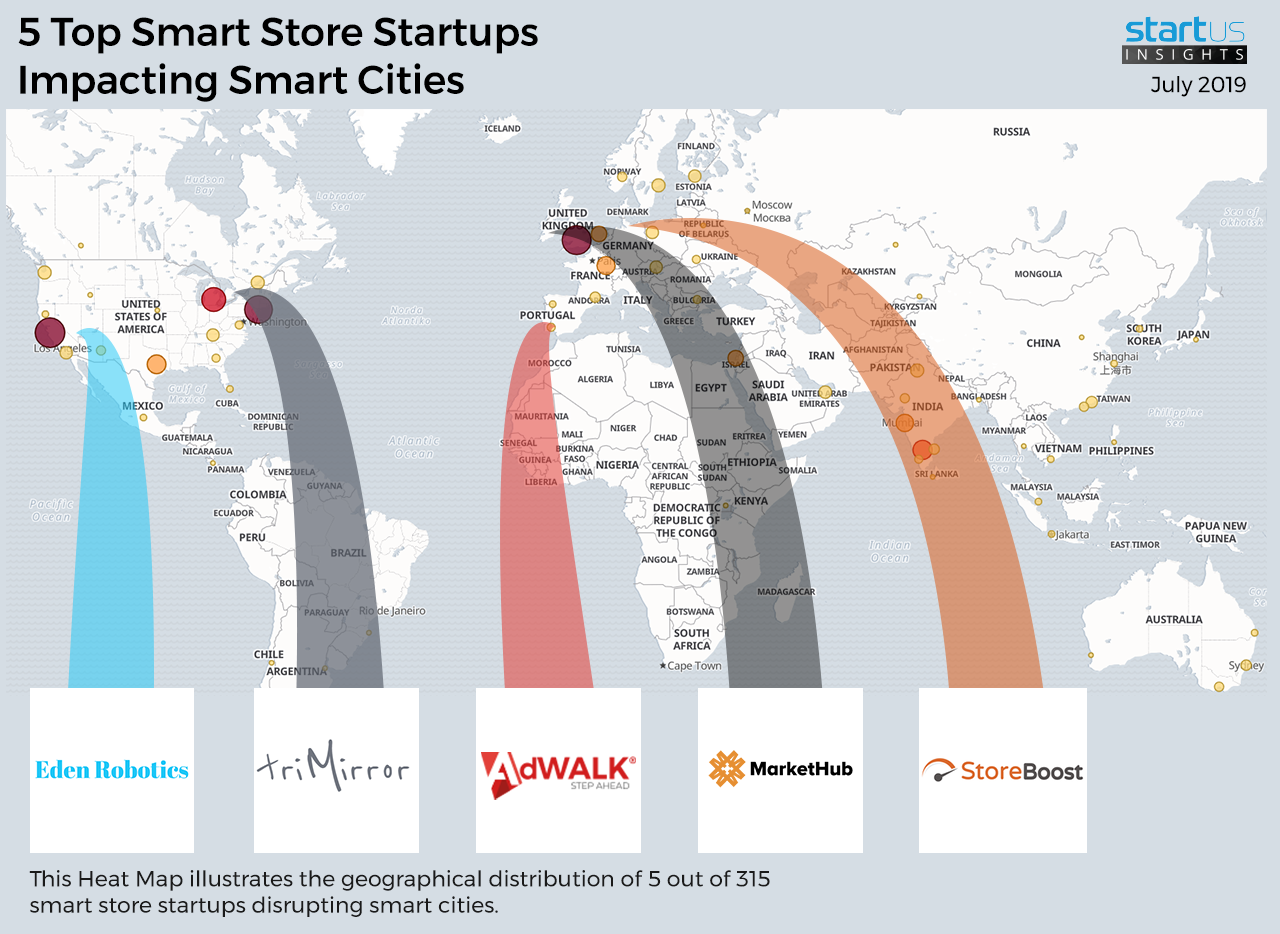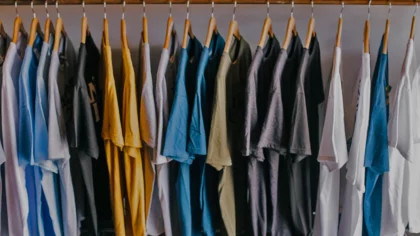Our Innovation Analysts recently looked into emerging technologies and up-and-coming startups working on solutions for Smart Cities. As there is a large number of startups working on a wide variety of solutions, we decided to share our insights with you. This time, we are taking a look at 5 promising Smart Store Solutions.
Heat Map: 5 Top Smart Store Solutions
For our 5 top picks, we used a data-driven startup scouting approach to identify the most relevant solutions globally. The Global Startup Heat Map below highlights 5 interesting examples out of 315 relevant solutions. Depending on your specific needs, your top picks might look entirely different.
MarketHub – Electronic Shelf Label
In stores, workers often spend a lot of time changing price labels. Electronic shelf labels allow the store to engage in real-time dynamic pricing in-store and build an omnichannel experience to enhance customer loyalty. It can display the prices of competition online so that consumers can compare prices with other stores, leading to improved customer satisfaction. Ireland’s MarketHub is an electronic shelf label provider to keep store prices dynamic and accurate so that the customers get to see the optimal price. Their main goal is to optimize the management of costs, stock and waste.
StoreBoost – Geo-Personalized Mobile Advertisement
Geo-personalized mobile advertising enables precise and targeted ad campaigns which can reach customers based on their location. For example, residents who are stuck in traffic can get notifications about alternative routes and those looking to grab a bite will be directed to a restaurant nearby. Germany-based StoreBoost analyzes potential customer location data in real-time and provides route and transportation information to identify and reach the desired location. This data is then used to create advertising campaigns which allow for highly personalized messages that increase awareness, clicks and conversion rates.
AdWalk – Augmented Reality (AR) Indoor Store Guidance
Customers always struggle to shop in large supermarkets – the aisles are too big and the products on display offer a lot of choices. To help customers cut through the noisy aisles, Augmented Reality for indoor store guidance helps them navigate within the store by showing digital content. It reduces the time spent in stores and makes the shopping process customer-friendly. AdWalk, from Spain, develops an AR solution that creates digital projections of their shop for customers to ‘walk through’. AdWalk uses artificial intelligence (AI) and computer vision to characterize users and track their position, posture, and gestures as they move across the shop.
Eden Robotics – Mannequin Robots
Textile and fashion stores are always looking for innovative ways to impress the customer so that they keep sales high. Costs too can be controlled by technologies like the Android Robot Fashion Models. Eden Robotics, an American startup, develops Mannequin Robots – human-like interactive robots which navigate through the shop with the customer, making suggestions and working as an assistant, thereby bringing down costs on hiring retail workers and customer service. These Android Robot Fashion Models are created for greeting, guiding and entertaining customers entering the store. A robotic skeleton, embedded inside the silicone skin, allows the robot to imitate human gestures and movements.
triMirror – In-Store Virtual Mirror
Customers often have to try on a lot of clothing before choosing the right one. The virtual mirror offers a novel approach to try on clothing by using a touch screen or a Kinect camera to enable gesture control and a higher level of interactivity. Information on sizes and colors is pre-recorded, allowing for recommendations to match pieces of clothing with each other, boosting cross-sales. It eliminates the need for changing rooms inside retail stores. triMirror of Canada develops an In-Store Virtual Mirror that allows customers to create their own shopping personalities (avatars) to try on actual clothing. User can use gestures to control the avatar, to select the virtual clothes to try on and to navigate the rest of the user interface. The mirror also lets shoppers instantly share their shopping experience with friends, family and social media communities.
What About The Other 310 Solutions?
While we believe data is key to creating insights it can be easy to be overwhelmed by it. Our ambition is to create a comprehensive overview and provide actionable innovation intelligence for your Proof of Concept (PoC), partnership, or investment targets. The 5 startups showcased above are promising examples out of 315 we analyzed for this article. To identify the most relevant solutions based on your specific criteria and collaboration strategy, get in touch.









